Top Shopify Alternatives to Consider in 2026

Starting an online store is an exciting step, but choosing the best platform for your needs can be challenging. As of mid-2025, over 5.8 million live websites use Shopify globally, with more than 112,000 in India alone, according to BuiltWith. Shopify's usability and features make it extremely useful and highly favoured among many businesses. Yet, Shopify isn't the right fit for every company. The high costs, limited design flexibility, and dependency on paid apps or developers for advanced features lead some businesses to explore Shopify alternatives.
Your choice of e-commerce platform should adapt as your business grows, but changing your e-commerce platform can involve migration costs, technical barriers, and SEO factors to consider.
So, whether you're running a small business or a startup looking for Shopify alternatives for free, or a big organization in need of big Shopify competitors, this article explores the most recommended Shopify alternatives like Shopify, and we hope that from this, you will be able to choose one as per your requirements. Let's explore various Shopify alternatives and competitors for your e-commerce success.
In a Nutshell
Shopify might not be ideal for everyone. Top Shopify alternatives include BigCommerce, WooCommerce, Magento, Wix, Squarespace, Shift4Shop, Ecwid, and Commercetools, excellent picks for better pricing, flexibility, or specific business needs.
What Is Shopify?
Shopify is a leading e-commerce platform that enables businesses to build online stores, manage products, process payments, and make shipping easy. Using its drag-and-drop product builder, app marketplace, and reliable hosting makes this platform ideal for beginners and scaling brands. Shopify comes with regular and premium versions. As of July 2025, Shopify holds a rating of 4.4 out of 5 on G2, based on thousands of user reviews highlighting its ease of use and reliable performance.
Shopify: The benchmark platform, best suited for small to medium businesses.
Shopify Plus: The premium version for large businesses, offering more complex customization (e.g., advanced checkout customization, enhanced AI access, advanced custom checkouts), automation, better reports, tools to manage many stores, and dedicated support for high-volume sales.
Despite being user-friendly and feature-rich, Shopify may not suit every business, as goals, budgets, or technical needs change.
Reasons Why You’re Probably Looking for a Shopify Alternative
‣ Cost Concerns
Shopify's monthly fees might seem fine at first, but the total fees can increase quickly. For small businesses and startups, Shopify pricing can be a huge investment.
On top of those fees, if you do not use Shopify Payments, you’ll be charged additional transaction fees up to 2% on the Basic plan, 1% on the Shopify plan, and 0.6% on the Advanced plan.
For cost-conscious businesses, particularly in countries such as India, a major consideration is to find affordable competitors.
‣ Limited Customization Options
While Shopify offers themes and apps to help you customize your store, you must know how to code or hire a developer familiar with Shopify’s “Liquid” template language (Shopify's coding syntax) to make unique changes. In such cases, you may feel blocked. Moreover, if a business demands a very unique look or special features, the Shopify system may not be enough.
‣ Dependency on the Shopify Ecosystem
When you rely only on Shopify, that can limit your chances to connect with other tools or develop custom workflows. Shopify has a preference for its ecosystem, and in some cases, it can be more complicated to integrate with external tools deeply or to create fully custom workflows, compared to open platforms. For businesses with complex operations, it can become frustrating.
‣ Transaction Fees
The downside of using a third-party payment gateway with Shopify is the extra transaction fees, which can cut down your profits. Sellers who have a higher sales volume are often attracted to platforms that charge lower or no fees.
‣ Functional and Scalability Challenges
Shopify can be limiting for businesses that need advanced SEO control, such as access to server-level commands or full customization of all files associated with SEO, although some functionalities are now present. While Shopify Plus is a good fit for big businesses, regular Shopify plans have limits.
Problems may arise when managing large and complex product lists, dealing with lots of website visitors at the same time, or connecting to complex backend systems. Lack of strong tools to manage inventory, special pricing rules, or specific order processes are some of the drawbacks of Shopify.
‣ Have a Large, Complex Catalog
If you have thousands of products with many variations (like sizes, colors, or styles) in your store, Shopify can be difficult to manage. In such cases, platforms that offer better ways to manage product lists, strong filtering options, and advanced search capabilities become an alternative to Shopify. Ideal Drape Makers is one example of a website that moved to BigCommerce because they preferred BigCommerce’s catalog handling.
Shopify Alternatives: Quick Overview
| Platform | Best For | Pricing Plan | Key Features |
|---|---|---|---|
| BigCommerce |
|
|
|
| WooCommerce |
|
|
|
| Wix |
|
| |
| Magento (Adobe Commerce) |
|
|
|
| Squarespace |
|
|
|
| Shift4Shop |
|
|
|
| Ecwid | Adding stores to existing websites |
|
|
| Commercetools |
| Custom pricing |
|
1. BigCommerce
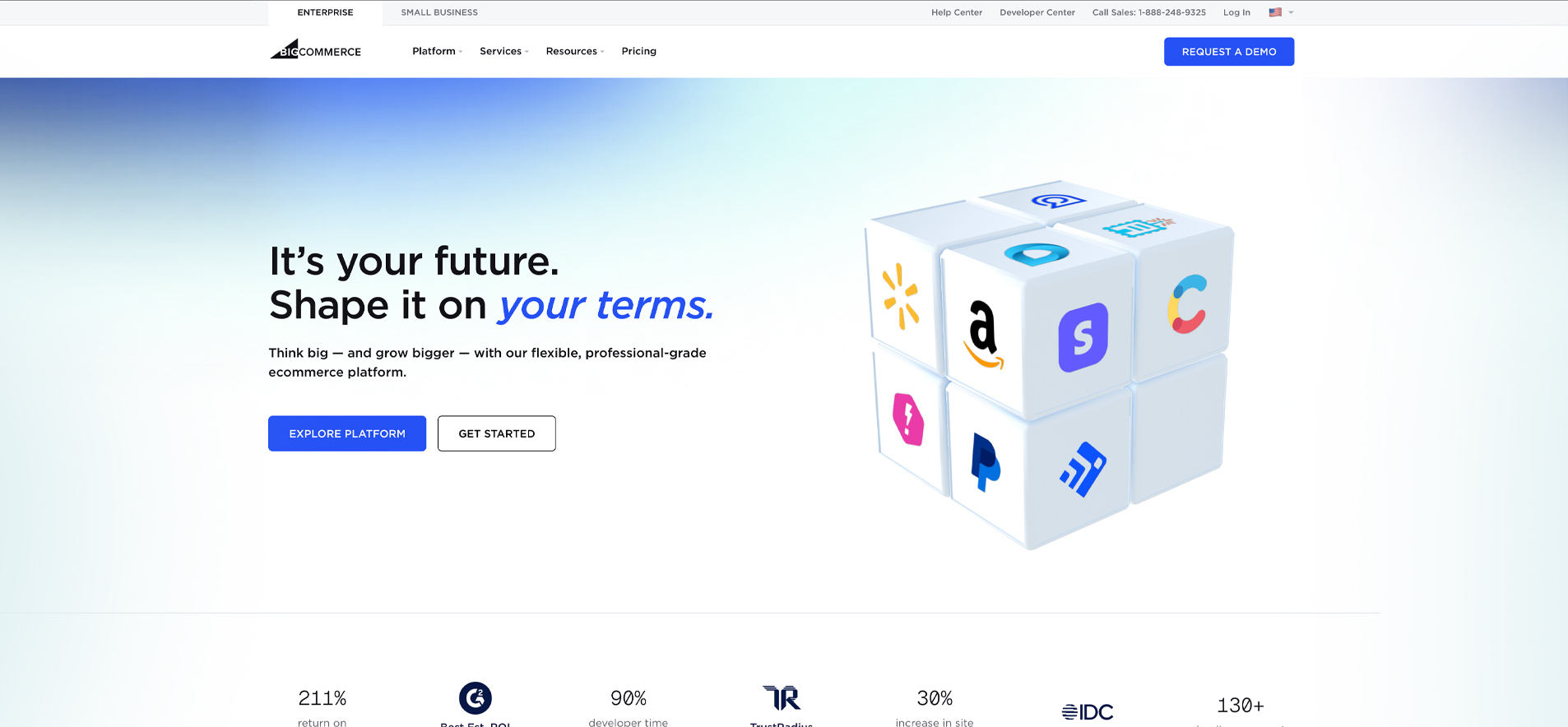
Founded in 2009, BigCommerce is an excellent cloud-based e-commerce platform for companies that want to grow quickly. It allows you to sell on Amazon, eBay, and social media, it has solid SEO capabilities, and it does not charge additional fees for most payment options. BigCommerce has so many built-in tools, so you do not have to rely so much on third-party apps compared to other platforms like Shopify. As of July 2025, BigCommerce holds a rating of 4.2 out of 5 on G2, based on thousands of user reviews highlighting its ease of use and reliable performance.
BigCommerce gave us better B2B tools and made backend integration way easier than Shopify.
Pros
- Absolutely no extra fees on payments, even with other payment methods.
- Built in real applications such as point of sale emails to help recover lost sales, and mobile-friendly pages.
- Can effectively handle large product lists, great for complicated stores.
- Developers can customize with full code access and APIs.
- Supports multiple storefronts under one account.
Cons
- The monthly cost ($29-$299) can be too expensive for new start-ups.
- There are fewer free themes available, and many of the premium ones cost extra.
- It can take time to learn to use advanced features.
- Harder to customize without coding skills or developers.
⭐Our Take
Go with BigCommerce for a full-featured store out of the box, so you don't face Shopify's constant add-on fees for basic tools.
Thinking about switching from Shopify?
Let's talkLoading...
2. WooCommerce
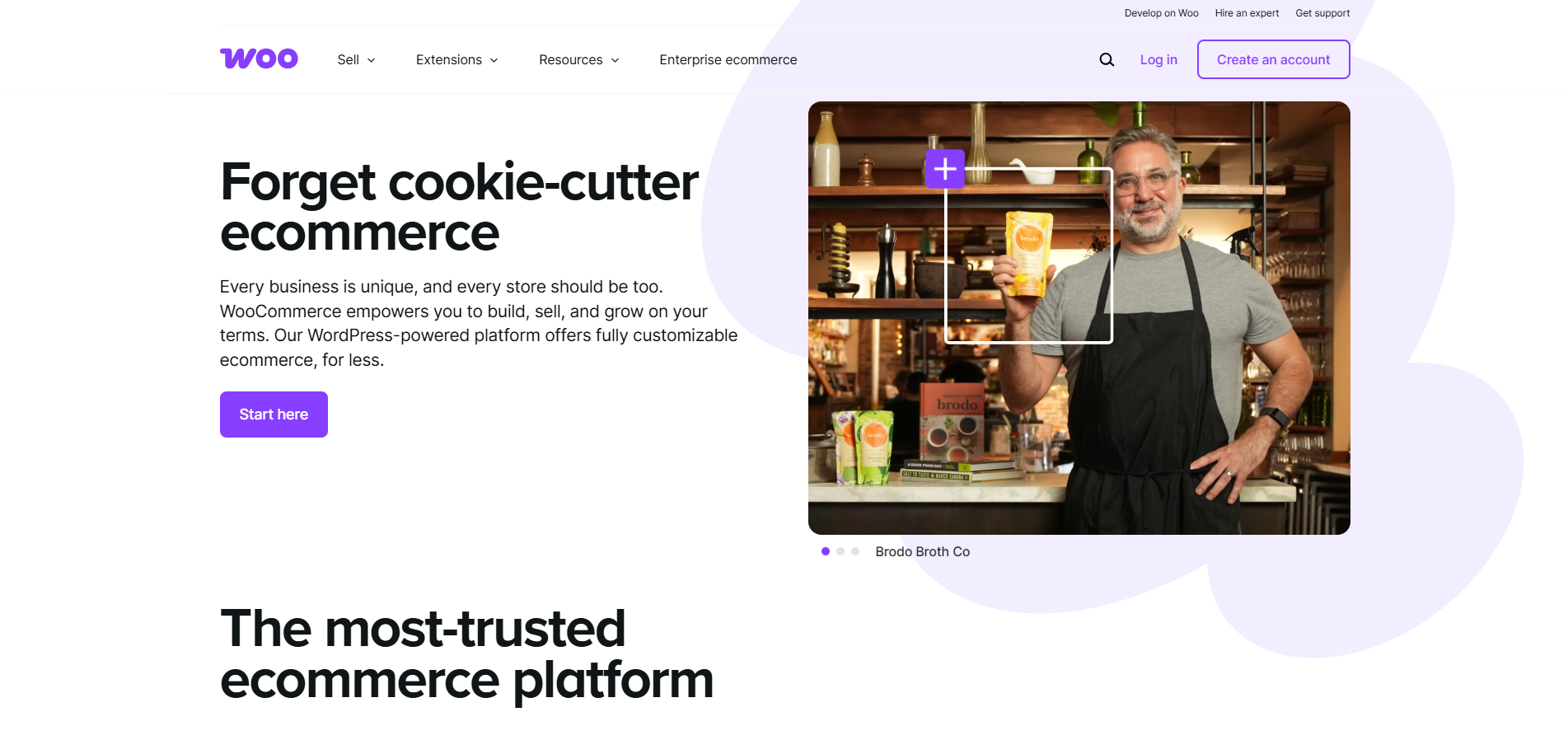 Launched in 2011, WooCommerce is a free WordPress plugin that converts your website into an online store. WooCommerce is a very popular choice for businesses already using WordPress. It is open-source, allowing you to customize it the way you need, making it one of the best free Shopify alternatives for technology enthusiasts. WooCommerce recently added a fast, no-reload Product Filters block using the Interactivity API in version 9.9. As of July 2025, WooCommerce holds a rating of 4.4 out of 5 on G2, based on thousands of user reviews highlighting its ease of use and reliable performance.
Launched in 2011, WooCommerce is a free WordPress plugin that converts your website into an online store. WooCommerce is a very popular choice for businesses already using WordPress. It is open-source, allowing you to customize it the way you need, making it one of the best free Shopify alternatives for technology enthusiasts. WooCommerce recently added a fast, no-reload Product Filters block using the Interactivity API in version 9.9. As of July 2025, WooCommerce holds a rating of 4.4 out of 5 on G2, based on thousands of user reviews highlighting its ease of use and reliable performance.
Shopify is good for getting started fast, but WooCommerce gives you full control. You own everything and can customize it to fit your business perfectly.
Pros
- Free to use, you only have costs related to hosting or optional plugins.
- Endless design and feature possibilities.
- Great for blogs and stores.
- Best for those who know WordPress.
- Full control over code and design.
- Highly customizable through themes, plugins, and code.
- Supported by a large community with plenty of help available.
- Strong SEO features with WordPress integration.
- No extra transaction fees from WooCommerce itself.
Cons
- You need to manage your hosting, updates, and security yourself.
- Finding and fixing problems can be difficult with so many plugins.
- Extra costs for hosting, themes, plugins, and development.
- To scale, strong hosting and a more technical setup are required.
- There's no direct support. Need to ask the community or developers.
⭐Our Take
WooCommerce is your best fit if your team already uses WordPress or other tools. It integrates smoothly, whereas Shopify often feels like a fresh start.
3. Magento (Adobe Commerce)
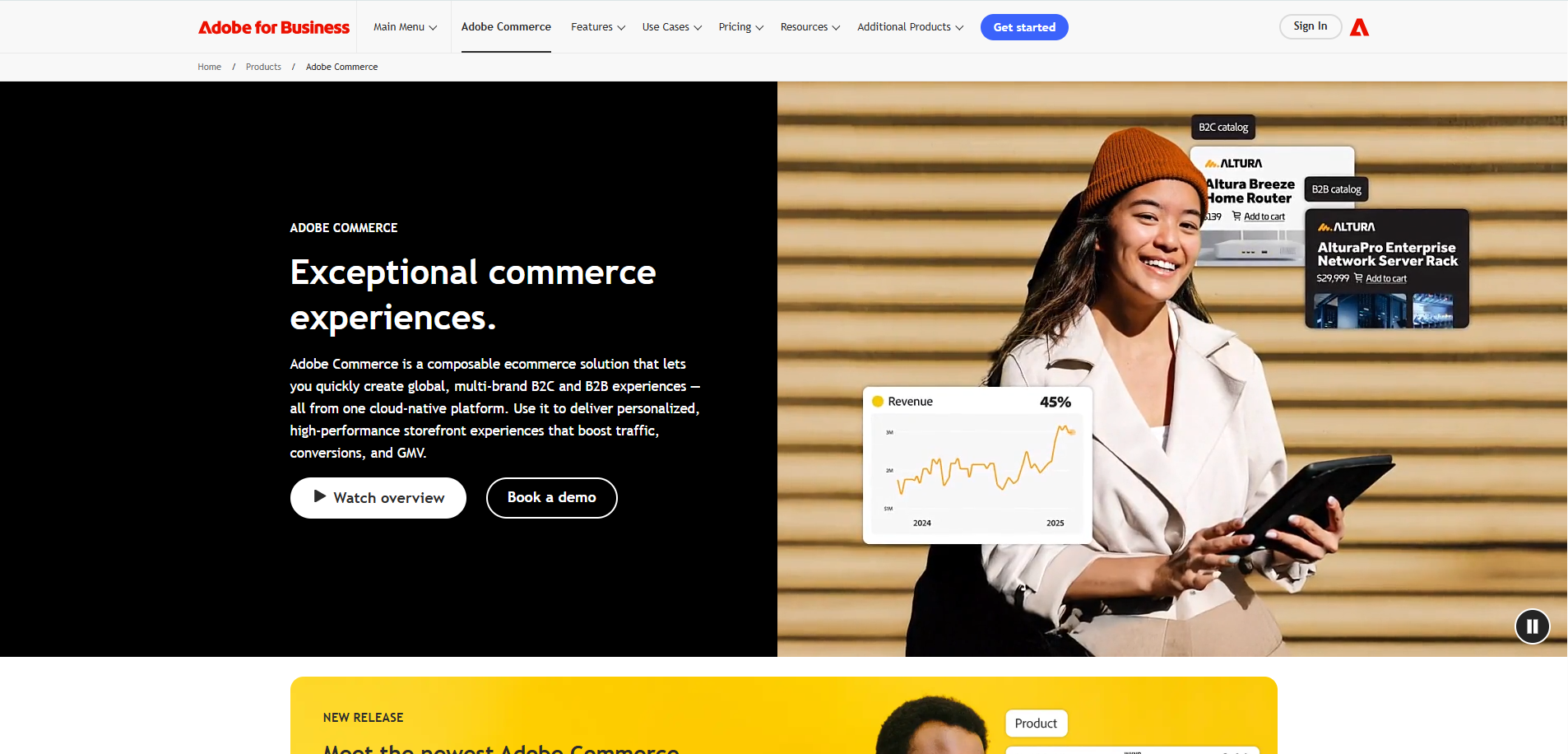 Originally released in 2008 and later acquired by Adobe in 2018, Magento, now branded as Adobe Commerce, is an open-source platform suited for complex, large businesses. Adobe Commerce is very customizable and scalable, which can make it a good option for larger stores. It comes with two versions. Magento Open Source (free) and Adobe Commerce (paid). The premium version can be expensive and requires technical expertise. Adobe Commerce recently released version 2.4.8 with improved GraphQL performance, PHP 8.4 support, and major security updates. As of July 2025, AdobeCommerce holds a rating of 4.0 out of 5 on G2, based on thousands of user reviews highlighting its ease of use and reliable performance.
Originally released in 2008 and later acquired by Adobe in 2018, Magento, now branded as Adobe Commerce, is an open-source platform suited for complex, large businesses. Adobe Commerce is very customizable and scalable, which can make it a good option for larger stores. It comes with two versions. Magento Open Source (free) and Adobe Commerce (paid). The premium version can be expensive and requires technical expertise. Adobe Commerce recently released version 2.4.8 with improved GraphQL performance, PHP 8.4 support, and major security updates. As of July 2025, AdobeCommerce holds a rating of 4.0 out of 5 on G2, based on thousands of user reviews highlighting its ease of use and reliable performance.
Pros
- It has a free version with a ton of customization options.
- It can handle big stores with heavy traffic, big catalogs, and multiple locations without a problem.
- Gives full control for design and features with open code and APIs.
- Comes with advanced tools like multi-store, B2B, and SEO.
- Great SEO tools.
- Supported by a large global developer and partner community.
- No platform transaction fees, just payment provider charges.
Cons
- Requires technical skills for setup and management.
- Hosting and premium add-ons can be expensive.
- Not beginner-friendly.
- Takes a long time to build compared to simple platforms.
⭐Our Take
Choose Adobe Commerce if your business needs more complex features and advanced customizations. Although Shopify Plus offers many features, it still follows a fixed structure with limited flexibility for deep customization. Adobe Commerce lets you build exactly the way you want.
4. Wix
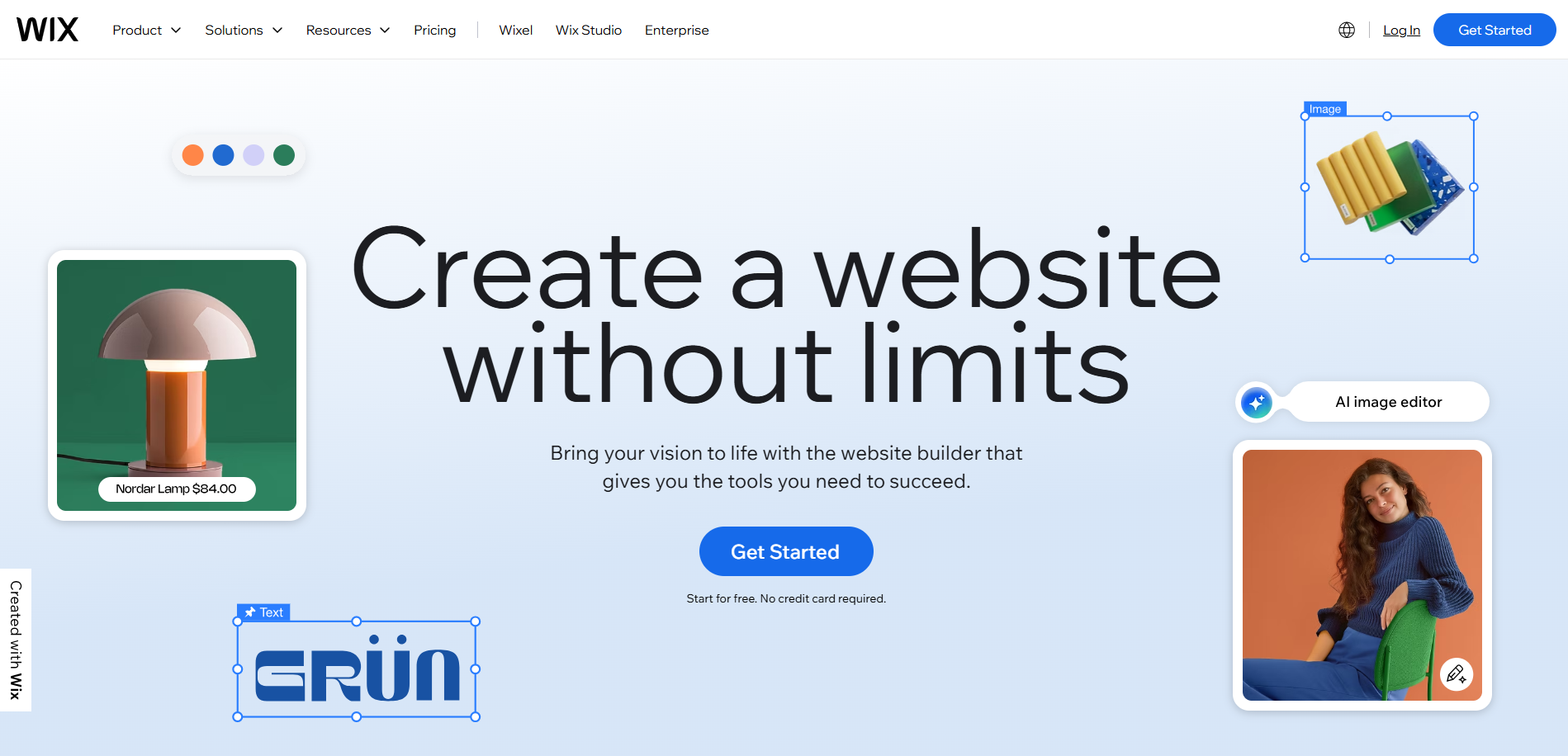
Launched in 2006, Wix is a user-friendly cloud-based platform with a drag-and-drop builder and over 900 free templates. Starting with general websites, Wix enhanced its features significantly. Its e-commerce plans come with AI capabilities to help you create designs and product descriptions, which makes it a strong alternative for small to medium stores looking to compete with Shopify. Wix recently launched its AI-powered Adaptive Content app, which dynamically personalizes website content in real time based on visitor characteristics. As of July 2025, Wix holds a rating of 4.2 out of 5 on G2, based on thousands of user reviews highlighting its ease of use and reliable performance.
Wix offers far more design flexibility than Shopify.
- Forbes Advisor, UK.
Pros
- A free plan is available for general websites, but e-commerce features require a paid plan.
- Simple editor with lots of design freedom.
- Built-in tools reduce the need for other apps.
- The drag-and-drop editor helps anyone build a store without coding.
- It has many professional templates for all kinds of businesses.
- You get marketing tools, SEO, and payments all in one place.
- The plans are usually more affordable than other platforms.
- Support is available anytime by phone or live chat.
Cons
- Limited Features for Advanced E-Commerce.
- Hard to Scale for Very Large Stores.
- Free Plan Doesn't Support Payments.
- The drag-and-drop system is simple but may not support advanced custom designs.
- Changing templates later can be hard and may require rebuilding the site.
- It works well for small to medium stores but may not suit large, complex businesses.
- Wix's payment providers charge transaction fees, and lower plans have limits on products and storage.
⭐Our Take
Choose Wix if the business isn't technical and needs a great-looking store up fast and easy. Shopify has a steeper learning curve for beginners.
5. Squarespace

Established in January 2003, Squarespace is recognized for building beautiful stores with over 180 templates with a simple interface. It also has a more user-friendly drag-and-drop editor than Shopify, making it an excellent choice for creative businesses looking for beautiful websites like Shopify or small storefronts that care a lot about looks and simplicity. As of July 2025, Squarespace holds a rating of 4.5 out of 5 on G2, based on thousands of user reviews highlighting its ease of use and reliable performance.
Users Feedback
Some people switch to Shopify after having trouble with platforms like Squarespace, especially businesses that do local delivery. But later, they might run into issues with Shopify, too, and start looking for other options. You can read mixed opinions here.
Squarespace recently added Recurring Invoicing, enabling users to schedule manual or automatic bills directly on their site, in the June 2025 product update.
Pros
- Gorgeous, mobile-friendly templates for professionally designed stores.
- Simple to use editor for a fast setup.
- 24/7 support and built-in marketing tools.
- Hosting, domain, SSL, and marketing tools come in one monthly plan.
- Higher plans have no transaction fees, which helps growing businesses.
- It supports digital products, subscriptions, and member-only content.
- Newer Squarespace sites let you change designs without rebuilding.
Cons
- Requires a Business plan ($23/month) to accommodate e-commerce.
- Not suitable for very large stores.
- Fewer features than Shopify or Bigcommerce.
- You get fewer payment methods than some other platforms.
- The app library is smaller, so you might miss specific tools.
- You can’t switch templates without rebuilding your site with old versions.
- Lower plans charge transaction fees.
⭐Our Take
Prefer Squarespace over Shopify if you need a simple, visually appealing website with limited eCommerce capabilities focused on service-based businesses, portfolios, or small product catalogs.
6. Shift4Shop
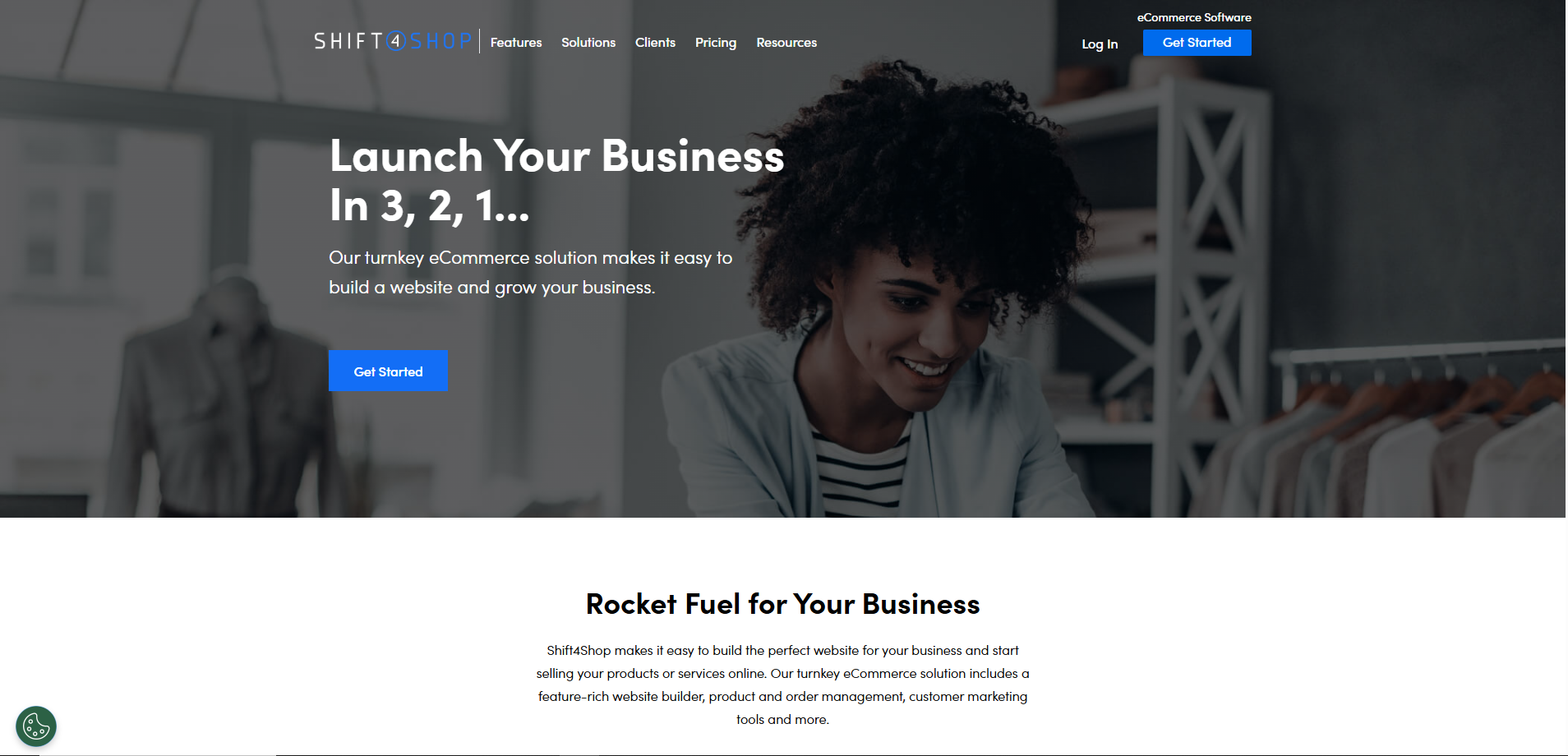
Started in 1997 as 3dcart and rebranded in 2020, Shift4Shop has a very attractive free plan as long as you use its payment system, making it a nice Shopify alternative that is free for businesses who are budget-conscious. It's perfect for small to medium stores, as it has unlimited products and advanced features. Shift4Shop recently launched v12, featuring Facebook Commerce integration, AI-powered fraud protection, ADA-compliant themes, and improved transaction reporting. As of July 2025, Shift4Shop holds a rating of 3.9 out of 5 on G2, based on thousands of user reviews highlighting its ease of use and reliable performance.
Shift4Shop was way ahead of the old platform we were using. It did everything our business needed, and more.
Pros
- Free with Shift4 Payments & no additional fees.
- Powerful tools for managing products and SEO.
- 24/7 customer support.
- You can add unlimited products and use unlimited bandwidth.
Cons
- Hard to learn for new users.
- Customer service quality can be inconsistent.
- Limited custom designs.
- The dashboard and builder look outdated and can be harder to use.
- The free plan requires using Shift4 Payments, limiting other options.
- Customizing designs may need tech skills since the editor isn’t straightforward.
- Some features are mainly focused on US-based businesses.
⭐Our Take
Choose Shift4Shop for powerful features built right in and no transaction fees if you use Shift4 Payments. You get more tools without the need for additional apps, giving you greater control over costs and avoiding constant add-ons that Shopify often requires.
7. Ecwid
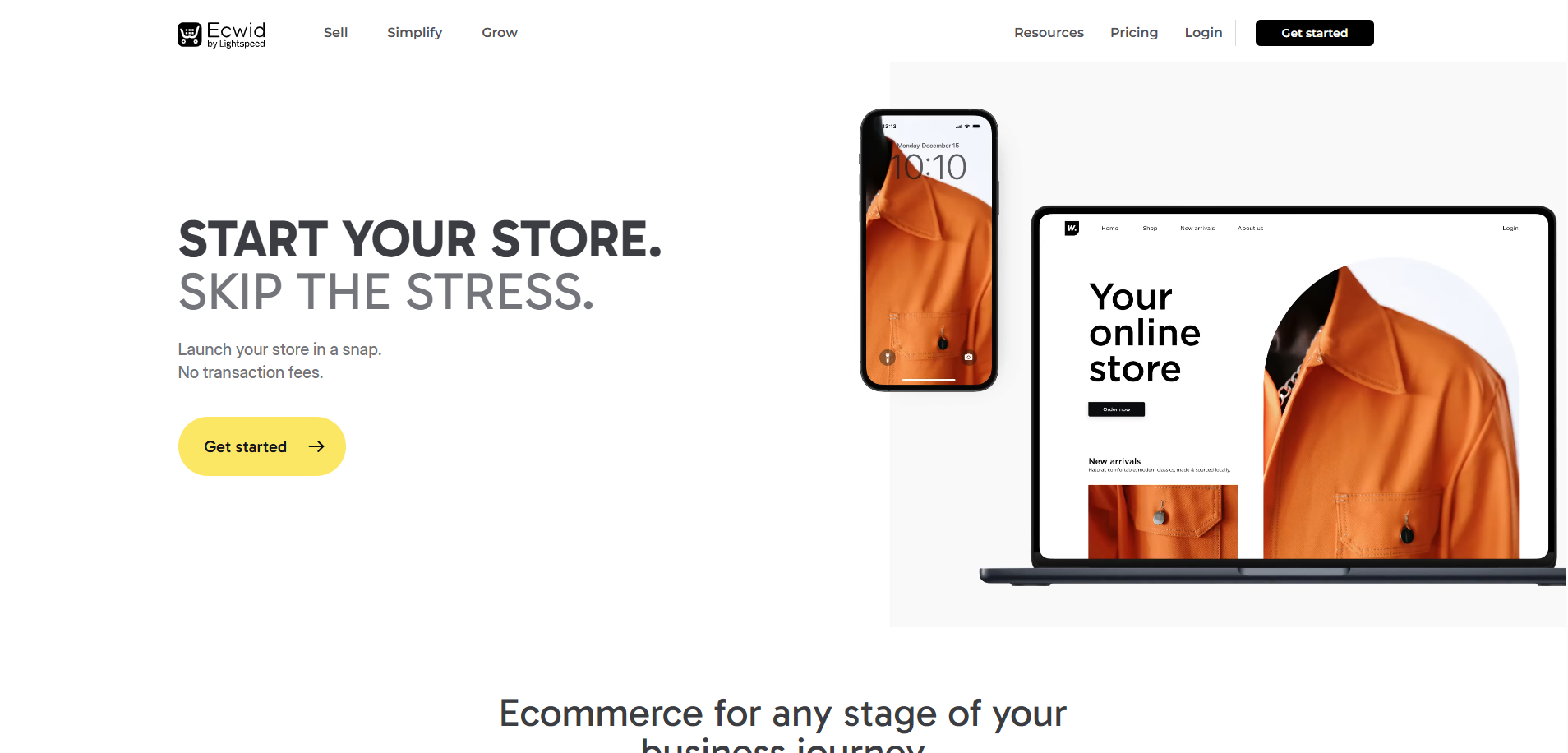 Formed in 2009, Ecwid (E-commerce Widget) is a shopping cart tool that lets you add a store to your existing site. Remember, it's not a complete website builder. Businesses can integrate Ecwid to WordPress, Wix, or even social platforms like Instagram. With their free plan, you can sell up to 5 products. Ecwid recently introduced visible ALT text on product images in June 2025, enhancing accessibility on storefronts. As of July 2025, Shift4Shop holds a rating of 4.7 out of 5 on G2, based on thousands of user reviews highlighting its ease of use and reliable performance.
Formed in 2009, Ecwid (E-commerce Widget) is a shopping cart tool that lets you add a store to your existing site. Remember, it's not a complete website builder. Businesses can integrate Ecwid to WordPress, Wix, or even social platforms like Instagram. With their free plan, you can sell up to 5 products. Ecwid recently introduced visible ALT text on product images in June 2025, enhancing accessibility on storefronts. As of July 2025, Shift4Shop holds a rating of 4.7 out of 5 on G2, based on thousands of user reviews highlighting its ease of use and reliable performance.
Even my least tech-savvy clients find Ecwid easy to use, far simpler than other store tools.
Pros
- No transaction fees and a free plan are available.
- Works on any website or marketplace, and social media with no effort.
- Sells worldwide and with multiple options for payment.
- Simple to set up and manage.
Cons
- 5 Product limit for the starting plan.
- Paid plans are required for Advanced Features starting from $25/month.
- Basic design options.
- Not a full website builder.
- Basic SEO tools with no built-in blog.
- Limited scalability for large stores.
⭐Our Take
Great for adding a small shop anywhere online. Unlike Shopify, you don't need a whole new website just for your products.
8. Commercetools
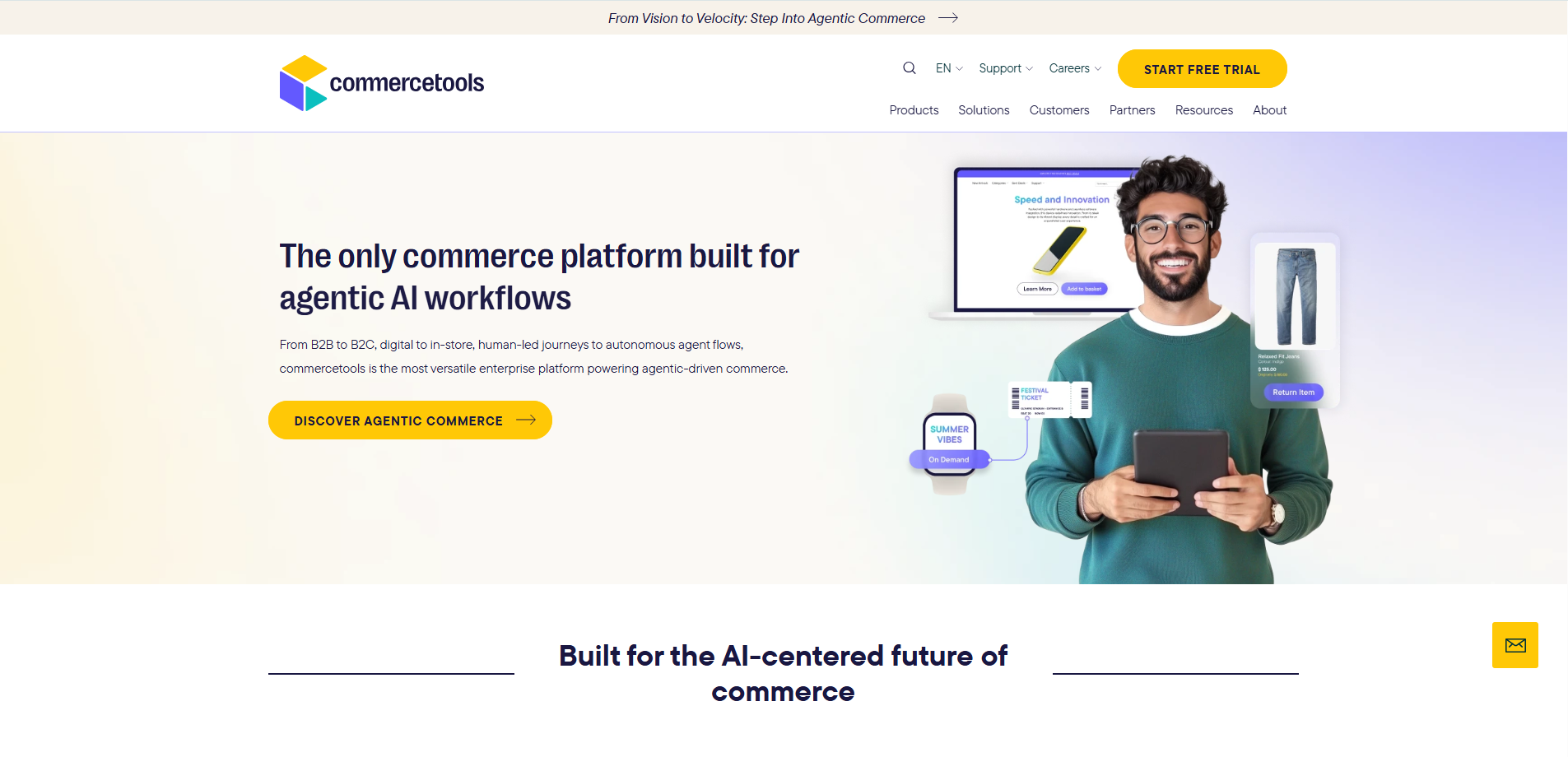
Started in 2010, Commercetools is a robust headless commerce platform intended for large enterprises with development teams. To that extent, it is a perfect fit for global brands and organisations that require full customisation. It is certainly not for small or non-technical businesses.
It's built on a modern system called MACH (Microservices, API-first, Cloud-native, Headless). Their API-based system has incredible flexibility and allows you to create custom stores and connect with any service, which makes it a good fit for global brands.
Commercetools' Spring 2025 update added AI promotions, recurring orders (automated repeat purchases on a schedule), and a unified system to manage both online and in-store sales from one platform. As of July 2025, Commercetools holds a rating of 4.6 out of 5 on G2, based on thousands of user reviews highlighting its ease of use and reliable performance.
Shopify couldn’t handle the unique way our products work, so we chose something more flexible, and found Commercetools.
Pros
- Extremely flexible as it has an API-driven design.
- Support for multiple stores and currencies.
- Scale effortlessly as a large company.
- Easily handles high traffic and sales.
- Smooth integration across sales channels.
- MACH setup supports future tech upgrades.
- No vendor lock-in for tools and services, but the complexity of implementation may create a form of lock-in with your development team.
Cons
- Custom pricing can be expensive.
- Requires developers for setup.
- Not useful for small businesses.
- Setup takes longer due to customization.
⭐Our Take
Opt for Commercetools if you sell complex services, subscriptions, or custom bundles that need flexibility. Shopify simply isn't designed for that level of complexity and changing requirements.
Thinking beyond Shopify: Is It the Right Move?
Shopify is still a good option for lots of businesses because it is simple to set up and use for businesses with simple products. The tools and apps make it easy for sellers to start without much technical knowledge. But as the business grows, it usually needs more advanced features and custom options.
Some businesses may not be able to find the features or have the level of control they need on Shopify. Whether you are migrating from other e-commerce platforms or considering a new platform for the first time, to be frank, there is no right platform. It just depends on your goals for the business, your budget, and your level of technical proficiency, which decides whether an e-commerce platform is suitable for your business.
Before making your decision, consider what you require the most: reduced costs, better design capabilities, or tools that help you grow. Try platforms before you commit by trying free trials or demos to see how they work for you.
Bottom Line
For those small businesses or creators looking for an inexpensive and low-hassle way to get started, eCommerce platforms like WooCommerce, Wix, or Ecwid provide flexibility with fewer license fees. Growing businesses that want scalability without a lot of technical work, platforms like BigCommerce, Shopify, or Shift4Shop, which balance features, control, and price, will be suitable. For larger businesses, Adobe Commerce or Commercetools offers maximum flexibility and custom workflows, but also comes with a much larger investment and technical burden.
Even though Shopify is limited by its dependence on paid third-party apps, does not have full customization, and has transaction fees, it is still one of the easiest and most reliable platforms available today. With the appropriate use case and setup, Shopify is still the best choice for many.
At Webandcrafts (WAC), we help businesses choose the right e-commerce platform and proceed with the right one that works best for them. Whether you are starting fresh, improving your current setup, or planning to move away from Shopify, we offer the guidance and support you need.
As a trusted e-commerce development company, we help brands build strong and flexible online stores that match their goals. If you are ready to take the next step, you can hire our expert e-commerce developers. In addition, our Shopify development services are focused on creating fast and reliable shopping experiences that are easy to manage. You can also hire Shopify developers from our team to build custom solutions that help your business grow with clarity and confidence.
Looking for a platform that scales with your brand?
Let's talkLoading...
Discover Digital Transformation
Please feel free to share your thoughts and we can discuss it over a cup of tea.










